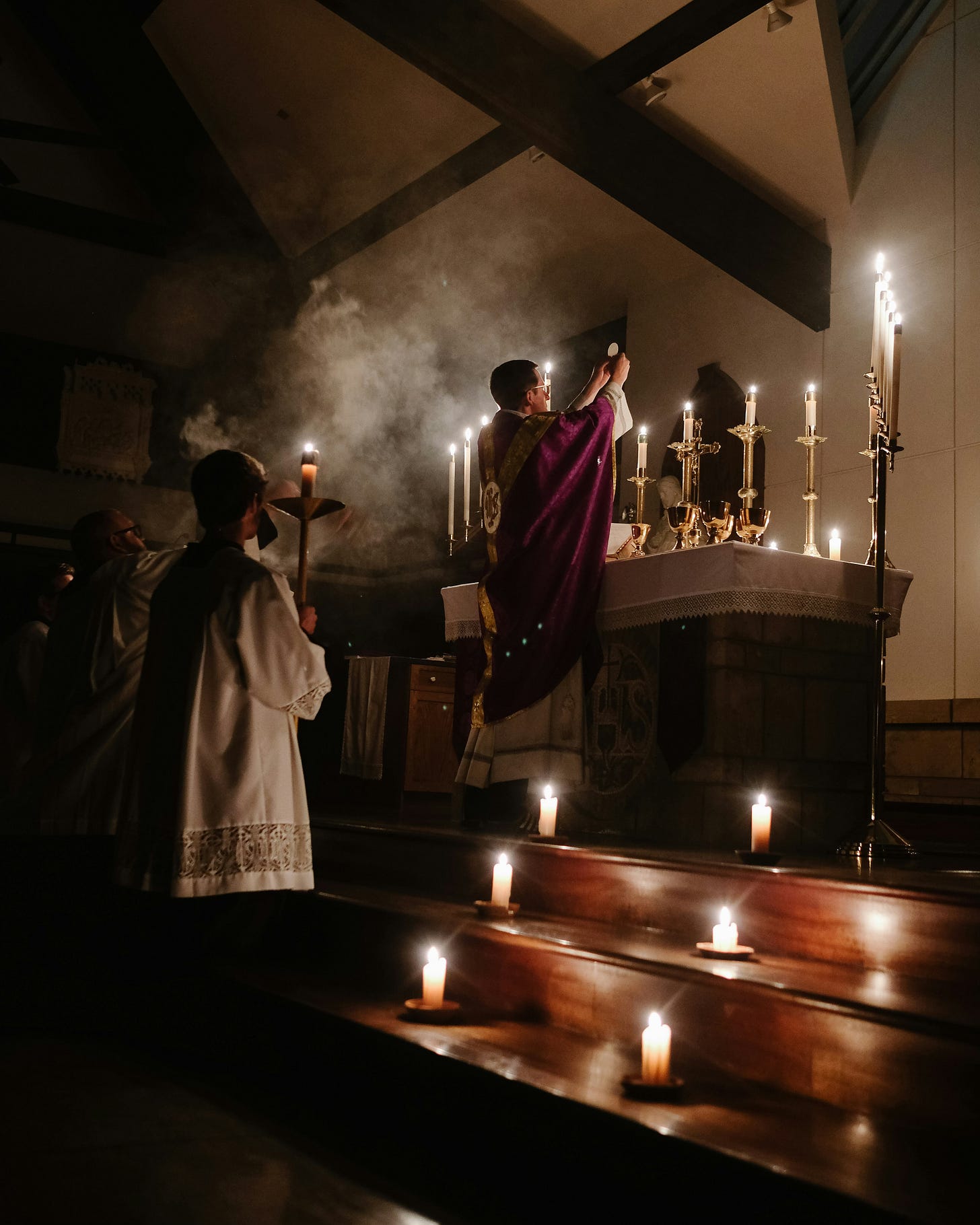Yesterday our pastor1 delivered a “perfect 10” sermon (linked here) in my estimation - if such a thing exists - drawing from the High Priestly prayer of Jesus in John 17. In it, he drew out all kinds of themes about what it means to be a priest, and how all the way back in Exodus 19:6, God called his people collectively into priesthood with the giving of the 10 commandments.
“You will be a kingdom of priests for me and a holy nation. These are the words you should say to the Israelites.”
Exodus 19:6
I think it’s safe to say that the average person sitting in the pew on a Sunday morning doesn’t sit down thinking, “I’m a priest!” But that is exactly what we are called to be. The implications of this are massive.

Imagine my surprise when I stumbled upon Numbers 11 this morning. I have a fairly regular rhythm most mornings using the Lectio 365 app2 combined with other books I am reading, but this morning, I decided to return to an older rhythm using the Book of Common Prayer: A Liturgy for Ordinary Radicals (an excellent formation resource)3. My timehop memory reminded me this morning that I received this book for Mother’s Day five years ago (as an aside, that timehop memory triggered a firestorm of other significant memories from that same day. Memories are a wild and powerful phenomenon!). I digress. I picked up my Common Prayer book and it fell open to May 7th because two pictures of my now 23-year old son Jacob as a toddler were tucked in there holding that page. (See? Memories. Everywhere!)
But rather than flip to May 13th, my eyes were drawn to some words on the page from Richard Foster, which kept me on the May 7th reading. It included Numbers 11 as the Old Testament reading for the day. Now, if you have never read Numbers 11, now would be a good time to hit pause on this article and go read it. No, I’m serious. Do it. Go read Numbers 11. Then come back. I prefer the Common English or New Living Translation, but use whatever translation fits your fancy. Ok, let’s make this easy: click HERE.
As I read this account this morning, my mind was spinning and twirling with themes from yesterday’s sermon coupled with the burdening realities Moses seems to be carrying in Numbers 11. In the sermon yesterday, we overheard Jesus, the Great High Priest, passionately pleading with the Father that we would be kept by love and truth, in order that we might continue to function as priests to the rest of the world. And in Numbers 11, we find Moses, the original priest of God’s people, seemingly buckling under the weight. The scene opens with intense complaints, fire, and loud cries.
God’s people have been freshly delivered from slavery in Egypt, but are complaining because of a lack of meat while waiting to enter the Promised Land. REALLY??! God miraculously delivered them from the hard hand of Pharaoh by parting raging waters (you know, everyday miracles!), and all they can think about is how “good” they had it in Egypt: “the fish we ate in Egypt for free, the cucumbers, the melons, the leeks, the onions and the garlic. Now our lives are wasting away”, they said (11:5-6). This represents perhaps the most extreme case of rose-colored lenses I have ever seen.
A people who nearly died in slavery are only remembering how good they had it with their daily diet. Phew. A small lesson in taking honest stock of where we have been in bondage in the past and the gracious realities at present.
In response to these complaints, God gets angry. Can you blame him?
He sets fire to the perimeter of the camp, I suspect, as a slight warning that the God of Israel will not allow this kind of worldly grumbling to consume his people. Rather, He is a consuming fire and if sprinkling it around the edges of our lives is needed to remind us of what is truly good and best for us, so be it.
And in the midst of this, Moses acts as a priest. He prays to the Lord in response to the cries of the people. One of the marks of a priest highlighted in our sermon yesterday is that a priest is a worship leader, someone who is creating environments for others to encounter the Living God. A priest is also a mediator between divine and material worlds, bringing God to the people and the people to God. Here, in Numbers 11, that is exactly what Moses is doing. The people need a priest. And Moses steps in to plead that God will not set fire to the entire community. Moses seemed to see potential in the people, even from their sinfully skewed perspective.
In contrast to the people’s desire to return to Egypt for meat, we read of how God supplied manna for them. It was enough to sustain them, but apparently not good enough to satisfy their enlarged bellies in the desert. We read that Moses can hear all the people crying out through their clans “each at his tent’s entrance”. Verse 21 tells us the number of people is 600,000 on foot. I live in the Twin Cities. This would be a “camp” the size of St. Paul and Minneapolis combined and then some. I cannot imagine the sound of everyone in the Twin Cities all standing on their doorsteps at the same time cursing God for not supplying for them. I bet it was a horrible sound for Moses as a leader. Which is why I can’t blame him for his “prayer” to God in vs. 11:
“Why have you treated your servant so badly? And why haven’t I found favor in your eyes, for you have placed the burden of all these people on me? 12 Did I conceive all these people? Did I give birth to them, that you would say to me, ‘Carry them at the breast, as a nurse carries an unweaned child,’ to the fertile land that you promised their ancestors? 13 Where am I to get meat for all these people? They are crying before me and saying, ‘Give us meat, so we can eat.’ 14 I can’t bear this people on my own. They’re too heavy for me. 15 If you’re going to treat me like this, please kill me. If I’ve found favor in your eyes, then don’t let me endure this wretched situation.”
Phew. Do you feel it?
Moses is bearing the weight of being a priest and it is crushing him.
He is feeling tired and worn from mediating on behalf of God’s people and it is leading him to question his roles and responsibilities to them. Afterall – he’s not their “mother”. He didn’t birth them and nurse them. And it feels completely reasonable that Moses feels pressure to give them what they want: MEAT! Where is he supposed to get meat for over half a million people??! (vs. 13). Not even Costco could handle an order that size!
But God speaks. He always does. He hears Moses frustration and fatigue. But he hears something else. He hears that Moses has forgotten what his role is and is not as a priest.
Moses’ role is to mediate not satiate.
Moses has been called to mediate God to the people and the people to God. His role is not to give the people what they crave, no matter how loudly they cry for it! Especially when what they want is a return to slavery and indulgence in appetites that won’t really satisfy them. For Moses, forgetting who he is leads to a dire request that if God is really going to make him keep leading these people, he would rather die (vs. 15).
Pause. I feel like right now…in my head…I have names and faces of pastors flipping through my mind who have felt like this. They just want to be priests. To help the people they lead see the living God. But those people seem hell bent on crying for worldly junk they think will satisfy them and they seem to think it is the leader’s job to help them get it. It’s no wonder pastors are fleeing churches in droves to drive Fedex trucks or do something where even getting bitten by a dog during a day on the job feels more sustainable. But hold on. God spoke. What did He say? Let’s listen.
First to Moses as a leader:
“16 The Lord said to Moses, “Gather before me seventy men from Israel’s elders, whom you know as elders and officers of the people. Take them to the meeting tent and let them stand there with you. 17 Then I’ll descend and speak with you there. I’ll take some of the spirit that is on you and place it on them. Then they will carry the burden of the people with you so that you won’t bear it alone.”
Did you hear it? It’s as if God is saying: “Moses – go find yourself a few leaders with potential, and bring them to the place where you worship. You have done this before. You know how to invite others into a space you have prepared to encounter me. What’s more, I have put my spirit in you, and I am more than capable of re-distributing it. Come on Moses. Let’s work together. This isn’t all on you. I can raise up other leaders to “carry the burden of the people WITH YOU, so that you won’t bear it alone.” (Numbers 11:17).
God also issues a bit of natural consequence type response to the people’s complaints. And he tells Moses to be sure to let them know that they will get exactly what they asked for…only it’s not going to give them the results they think they will get. I don’t think meat coming out their nostrils is what they had in mind.
But sometimes when we ask for what is not good for us, God allows it to expose the deception that what we thought was better was in fact, not.
And what is Moses’s response to these words? Hold your breath. It’s not ready acceptance. He is still stuck in sizing up the problem – seeing the mass of 600,000 people and still feeling very anxious about remedying their demands (vs. 21-22). But God, who is gracious, slow to anger and abounding in mercy and compassion reassures him: “Is the LORD’S power too weak? Now you will see whether my word will come true for you or not.” (11:23).
Now Moses is ready to move. There’s more to the story in the closing verses. A bit of a plot twist. I’ll leave us hanging here for now because the way the story ends holds some powerful bonus lessons that will need a little extra time and space to unpack. I’ll circle back to that next week.
For now, as you read today, maybe there are some invitations for you:
If you are a leader, where are you buckling under priestly pressure that is not yours to carry?
If you are a member of a community, what kinds of complaints are you loudly voicing that are pressing against your pastor?
And to all of us, where has past bondage presented itself falsely as a better option? What appetites have led you in that direction?
Grace and peace dear ones!
Be on the lookout for Part 2 of “Moses & the Mantle of Priestly Leadership”.
Rev. Matt Kennedy, Roseville Covenant Church, Roseville, MN
https://lectio365.24-7prayer.com/





